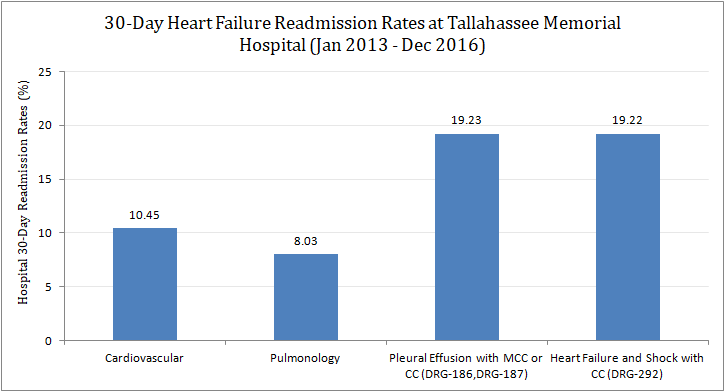Entresto’s Potential in Patients with Pleural Effusion based on Tallahassee Memorial Hospital Data
In Entresto, Heart Failure
Get Dexur’s Personalized Hospital Specific Presentation on Quality, Safety, Compliance & Education
By: Saparja Nag Mar. 19, 2018
Entresto, by Novartis, can provide key preventative benefits for patients at risk for heart failure if such risk factors can be identified prior to a HF event. Dexur’s analysis of HF readmissions within 30 days of an index hospitalization at Tallahassee Memorial Hospital serve as an excellent dataset to examine how Entresto might be used to improve patient care. The 30-day HF readmission rate for all inpatients admitted at the hospital was 5.91%. As expected, the highest 30-day readmission rate for HF was among cardiovascular inpatients at 10.45%. Pulmonology patients had the second highest readmission rate, readmitting 8.03% of patients for HF within 30 days. These high readmission rates indicate key areas where physicians may be able to additionally screen patients at risk for HF. Entresto may be a viable treatment option to prevent HF readmissions.
HF readmission rates were also analyzed by Dexur at the DRG-level, which were categorized by the diagnosis during index hospital stay at Tallahassee Memorial Hospital. Certain pulmonology patients also had HF readmission rates comparable to the rates of Heart Failure and Shock patients (DRG-291, 292, 293) readmitted with HF. The highest 30-day HF readmission rate among pulmonology patients at the hospital was for pleural effusions, which includes DRG-186 (Pleural Effusion with MCC) and DRG-187 (Pleural Effusion with CC). Combined, these patients were readmitted with HF within 30 days of their index hospitalization 19.23% of the time.
The 19.23% 30-day readmission rate for patients diagnosed with pleural effusion on their index hospitalization is nearly identical to the 19.22% HF readmission rate for patients who initially presented with DRG-292 (Heart Failure and Shock with CC). The similarity of these HF readmission rates suggests that a pleural effusion diagnosis is nearly as significant as a heart failure and shock diagnosis in determining patients who could ultimately be readmitted for HF, identifying a key area where Entresto could have positive effects on patients’ overall quality of life. Understanding DRG-based differences may illuminate target populations who could benefit from Entresto.

DEXUR PRO MEMBERS GET ACCESS TO:
- 30-day heart failure readmission rates for Tallahassee Memorial Hospital, state, and national levels for all inpatients, surgical status, and by department
ABOUT THE AUTHOR
